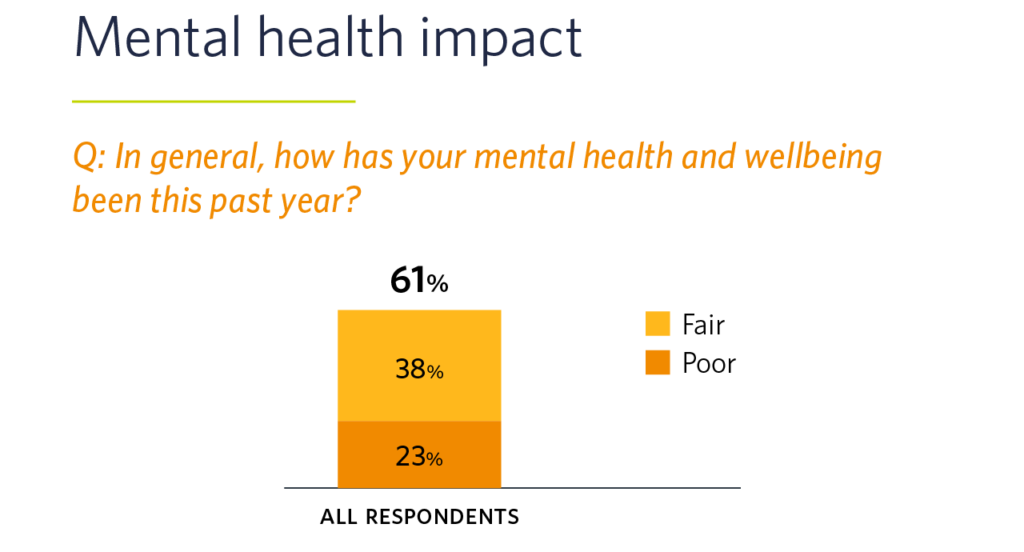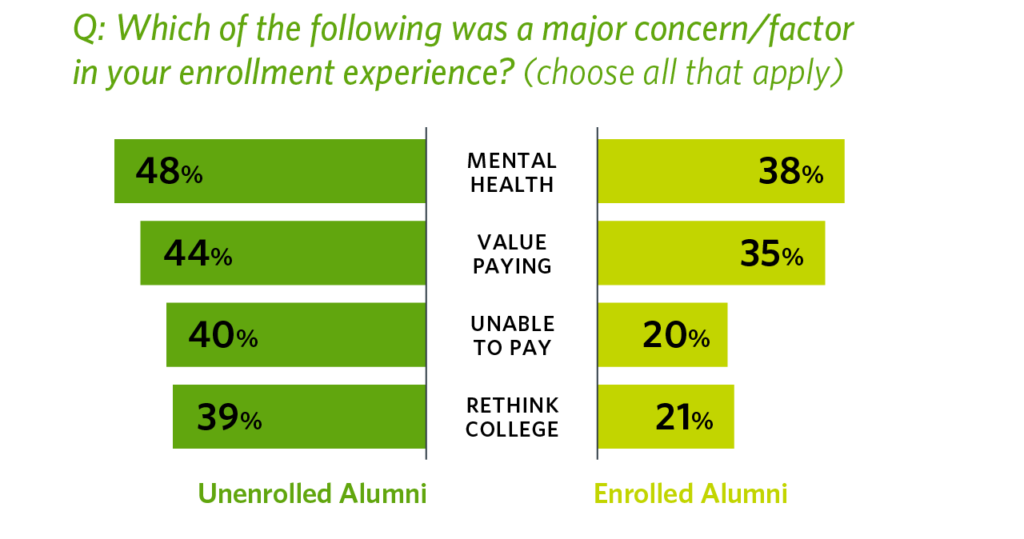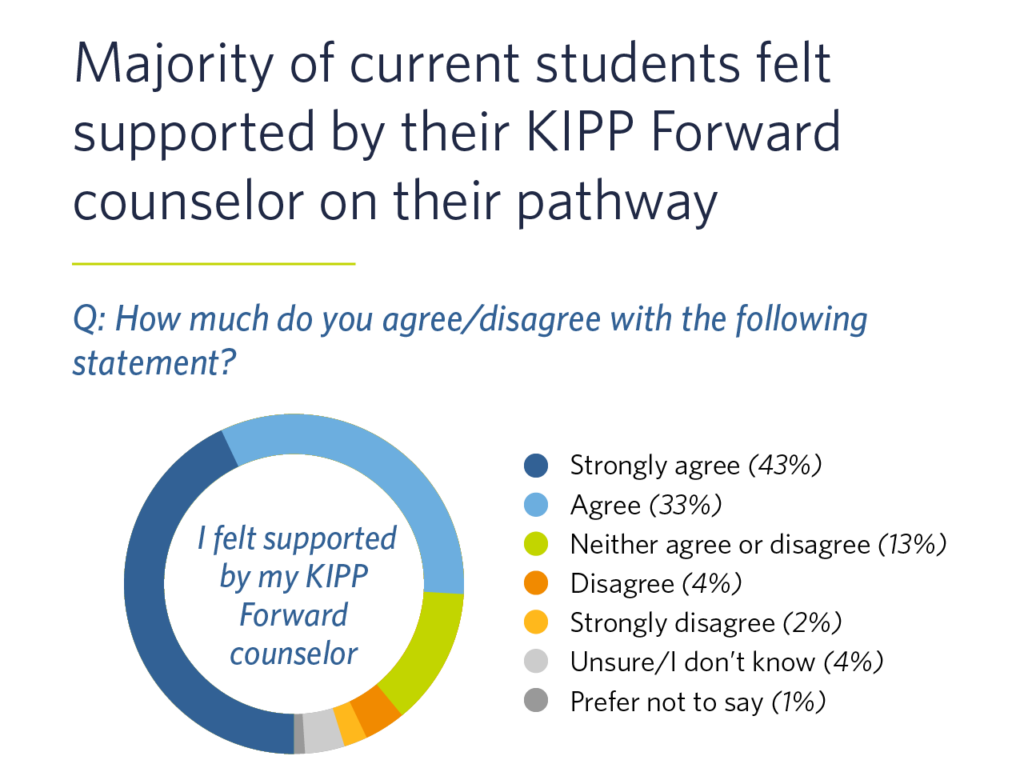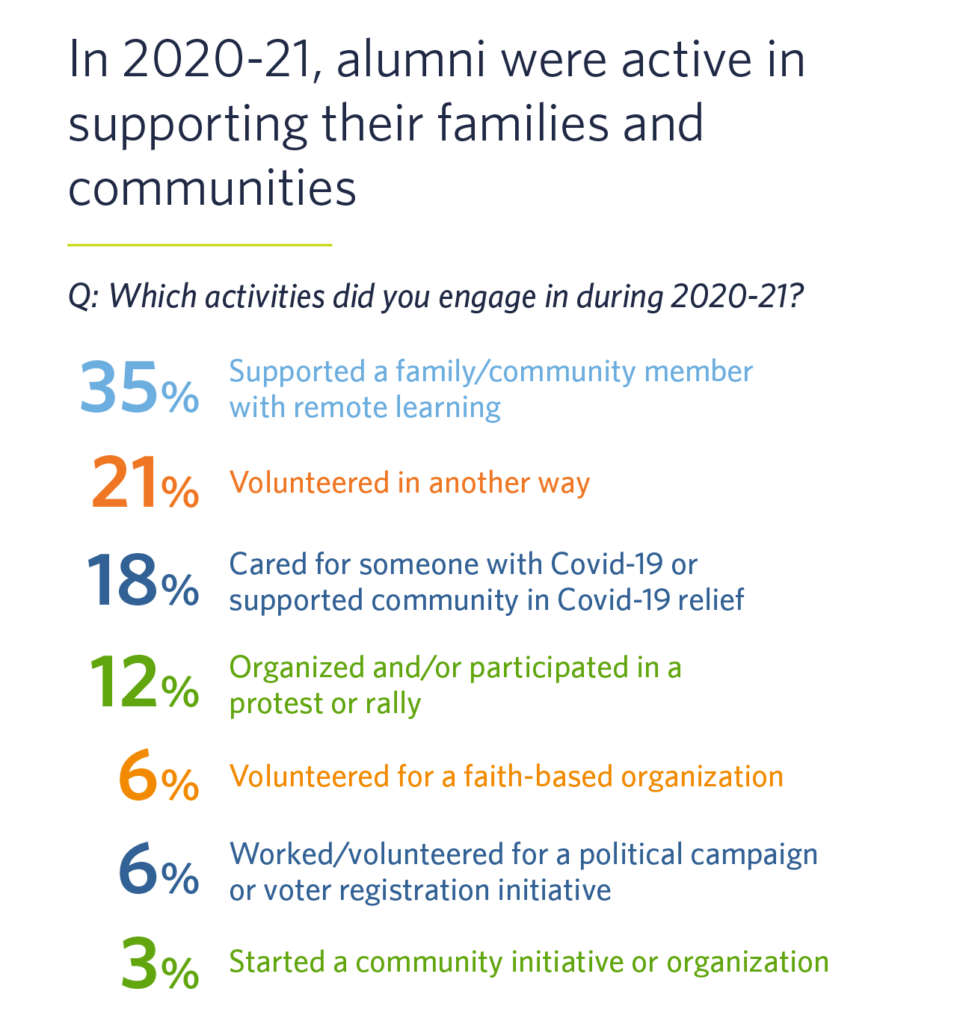KIPP Alumni Survey 2021
We have all committed to creating a future without limits. We support and amplify the voices of more than 30,000 KIPP alumni today, knowing that our number of alumni will grow to 80,000 by 2025.
This year, we wanted to better understand the ways in which the COVID-19 pandemic has affected our alums’ college and career journeys, as well as their general well-being. We wanted to find out what structural support our alumni are most urgently looking for and give ourselves the opportunity to respond where we could. We are a team and family, and this is what we do.
Five-thousand alumni from the KIPP high school classes of 2013 – 2021, representing all KIPP regions, shared their thoughts with us. Two-thirds of respondents to the survey are currently enrolled in a bachelor’s degree, associate degree, or Career & Technical Education (CTE) program.
The issues we see reflected in our KIPP Alumni Survey echo what young people and their families are facing nationwide which include a drop in college enrollment and postsecondary programs, and an increase in mental health concerns. At KIPP, we’re committed to doing our part to address these issues, both in our own work and by partnering with others. Below are some of the highlights from this year’s alumni survey.
What We’re Learning: Mental Health
Across the board, whether they were currently enrolled in college or CTE, our alumni highlighted mental health and personal finances as their top two concerns. For all KIPP alumni, 61 percent reported “fair” to “poor” mental health. Similarly, a March report from the Centers for Disease Control and Prevention found that 57 percent of young people nationwide between 18-29 years old reported experiencing symptoms of anxiety and depression within the last seven days. KIPP alumni identified that direct financial support for counseling, access to virtual therapy, and sharing resources were most helpful as mental health supports.


What We’re Doing: Mental Health Support
KIPP alumni identified that direct financial support for counseling, access to virtual therapy and sharing resources were most helpful as mental health supports. So, over the past 12 months, KIPP Alumni Network’s partnership with Ayana Therapy provided free, culturally competent, clinical therapy for more than 600 KIPP alumni. For those unfamiliar with Ayana, it is an online mental-health platform with a therapist community that is diverse, culturally competent, and experienced.
What We’re Learning: Enrolling and Staying Enrolled in Higher Education
Many of our alumni reported that the events of the past year have led them to rethink college as a step in their career or life path. We know that 72 percent of our 2020 senior class enrolled in higher education right after graduating, down from 85 percent in 2019. We asked alums who did not enroll in higher education, or who paused their studies, to share with us the reasons why. Alumni reported the two top reasons were 1) mental health and 2) a re-assessment of the value of pursuing higher education given its costs. The chart below details the most cited reasons.

What We’re Doing: Microgrants on National Scale
After the start of the COVID-19 pandemic, the KIPP Foundation launched an initial emergency fund in the spring of 2020, and then a more comprehensive Bridge Fund, to address unexpected one-time costs or fees that could prohibit a student from enrolling or persisting in college or a training program. Research – and our own data – shows that relatively small microgrants can significantly boost college enrollment, persistence, and completion rates for college students from low-income backgrounds.
Over the course of the first year:
- Our network made 1,679 microgrant awards to 1,027 KIPP alumni.
- 90 percent of those awardees are persisting or graduated from their chosen postsecondary education/training program.
- 75 percent of awards went to alumni pursuing a bachelor’s degree; 11 percent to associate’s, 3 percent to certification programs. 11 percent went to high school students applying for or matriculating to postsecondary programs.
- $696 was the average grant size.
In October 2021, the KIPP Foundation launched our first National Microgrant Program, shifting the administrative burden of microgrant administration from regions to the Foundation. Alumni can receive micro-grants to cover unexpected and non-reoccurring expenses for postsecondary education or training.
What We’re Doing: Adding Capacity to Advise Unenrolled & Under-Enrolled Alumni
The KIPP Foundation also launched a $3 million, two-year Reenrollment & Transfer Grant program to boost the capacity of KIPP Forward regional teams to engage and advise alumni whose postsecondary education or training plans were deterred by the pandemic. This advising program, when combined with microgrants, will enable interested alumni to enroll or re-enroll in college or technical education programs or transfer from community college to a bachelor’s degree program. Over twenty regions are participating in the initiative, targeting over 6,000 alumni for intensive support.
What We’re Learning: KIPP Forward Support and Career Planning
Over 75 percent of KIPP alumni enrolled in school said they felt supported by their KIPP Forward counselors! Alumni cited greater financial aid and help finding jobs related to their educational fields as the main supports that would help them persist on their college and career pathways. About one-third of survey respondents reported having completed at least one internship, and two-thirds of those who had internships reported their experience was relevant to their long-term career aspirations.

What We’re Doing: Career Development
We are using YouScience results, an innovative aptitude and career discovery tool, to inform our students’ postsecondary search, applications, and decisions process.
We’re offering “Landing a Strong Job/Internship,” powered by Basta, a series of 10 virtual, interactive workshops towards landing a strong first job or internship in the upwardly mobile career field of a participant’s choice.
We’re partnering with two organizations – Avenica and YuPro – to offer a career-coaching program, including assessments, 1:1 coaching and mentoring, skill development, and career guidance. This program is open to all alumni, with no postsecondary degree or credential required, to support alumni who are as yet unenrolled.
We’re partnering with Braven for the Braven Career Booster program, a two-week virtual career accelerator for recent college graduates who earned their degrees in 2018, 2019, or 2020 to learn about topics like building effective LinkedIn profiles, interviewing for jobs, networking, etc.
What We’re Learning: Building A More Just World
Even during a challenging year, our alumni made time to devote energy to family and helping others in the community. Thirty-five percent of alumni reported supporting a family or community member with remote learning, and at least 20 percent volunteered in other ways, cared for someone with COVID-19, or participated in pandemic relief efforts.

